

Engaging young people/young adults in literacy, language and numeracy skill development - NZ Department of Labour. The programme The South Pacific Academy (SPA) was first set up 20 years ago by a private provider-a Pacific Island man who wanted to help Pacific Island youth achieve qualifications that would help them get employment.
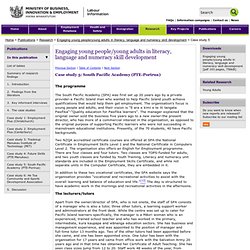
The organisation's focus is young people and adults, and their vision is "E ara e kimi e te iti tangata Pasifika"-"Quality education for Pasifika learners". The manager explained that the original owner sold the business five years ago to a new owner-the present director, who has more of a commercial interest in the organisation, as opposed to the original purpose of supporting Pacific learners who were not succeeding in mainstream educational institutions.
Presently, of the 70 students, 40 have Pacific backgrounds. Two NZQA accredited certificate courses are offered at SPA-the National Certificate in Employment Skills Level 1 and the National Certificate in Computers Level 2. The lecturers/tutors Apart from the manager, the other teaching staff are not trained teachers. Pacific Learning. Education and Pacific Peoples in New Zealand.
The second report in the Pacific Progress series, Education and Pacific peoples in New Zealand looks at Pacific peoples’ experience of the education system and the most important factors for educational success.
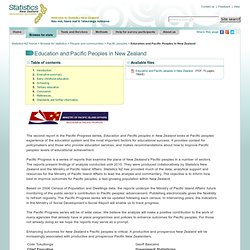
It provides context for policymakers and those who provide education services, and makes recommendations about how to improve Pacific peoples’ levels of educational achievement. Pacific Progress is a series of reports that examine the place of New Zealand’s Pacific peoples in a number of sectors. The reports present findings of analysis conducted until 2010. They were produced collaboratively by Statistics New Zealand and the Ministry of Pacific Island Affairs. Statistics NZ has provided much of the data, analytical support and resources for the Ministry of Pacific Island Affairs to lead the analysis and commentary. Education and Pacific Peoples in New Zealand. Early childhood education Early learning experiences and relationships have a lasting effect on children’s achievement.
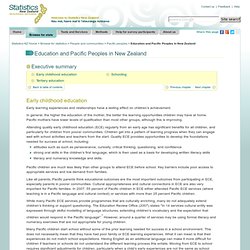
In general, the higher the education of the mother, the better the learning opportunities children may have at home. Pacific mothers have lower levels of qualification than most other groups, although this is improving. Attending quality early childhood education (ECE) regularly from an early age has significant benefits for all children, and particularly for children from poorer communities. Children get into a pattern of learning progress when they can engage well with school activities and teachers from the start. Attitudes such as such as perseverance, curiosity, critical thinking, questioning, and confidence strong oral skills in the children’s first language, which is then used as a basis for developing written literacy skills literacy and numeracy knowledge and skills. Pacific children are much less likely than other groups to attend ECE before school. Education and Pacific Peoples in New Zealand. [Parents and teachers working together] is like a bird needing two strong wings to fly.
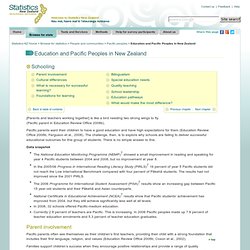
(Pacific parent in Education Review Office 2008b). Pacific parents want their children to have a good education and have high expectations for them (Education Review Office 2008b, Ferguson et al., 2008). The challenge, then, is to explore why schools are failing to deliver successful educational outcomes for this group of students. There is no simple answer to this. Data snapshot The National Education Monitoring Programme (NEMP)7 showed a small improvement in reading and speaking for year 4 Pacific students between 2004 and 2008, but no improvement at year 8. Parent involvement Pacific parents often see themselves as their children’s first teachers, providing their child with a strong foundation that includes toptheir first language, religion, and values (Education Review Office 2008b; Coxon et al., 2002).
Bilingualaotearoa - The Palagi Pacific Education Plan for Pasifika Peoples. Pasifika Education Plan: Monitoring Report 2009. Ministry of Education - Pasifika Education Plan 2009 - 2012. Initiatives implemented to improve Pacific students achievement in literacy and numeracy - Education Review Office. Most schools were involved in school-wide initiatives to improve all students’ literacy and numeracy achievement.
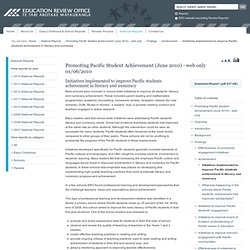
These included parent reading and mathematics programmes, academic counselling, homework centres, reception classes (for new entrants), Duffy ‘Books in Homes’, a readers’ club, a summer reading contract and teachers engaged in action research. Many leaders said that school-wide initiatives were addressing Pacific students’ literacy and numeracy needs.
Some had evidence that these students had improved at the same rate as other students. Although the intervention could be seen as successful for many students, Pacific students often remained at the lower levels compared to other groups of their peers. These schools did not do anything to accelerate the progress of the Pacific students in those lowest levels. In a few schools ERO found professional learning and development approaches that did challenge teachers’ ideas and expectations about achievement.